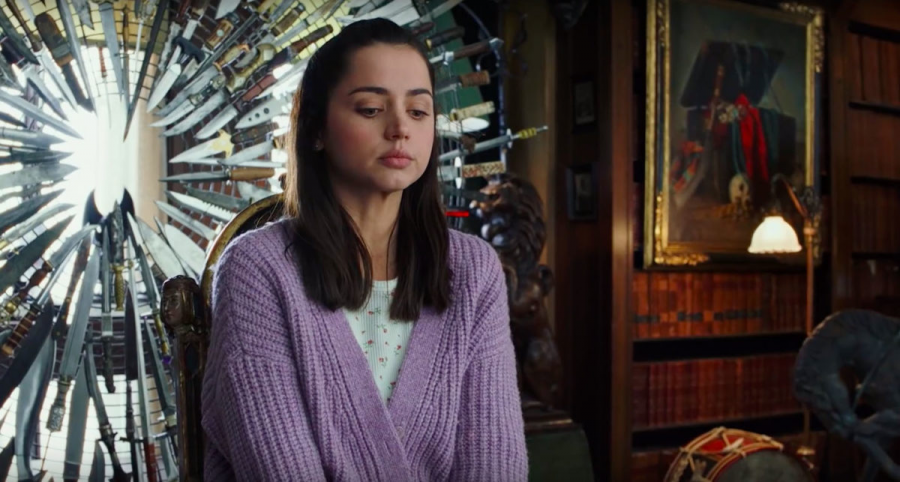Take “Knives Out” Off Your Pandemic Watchlist
In the process of locating this image, I found that one of the most frequently-Googled questions about Knives Out is “What did Marta do in Knives Out?” I wouldn’t be surprised if people left theaters still wondering who the main character was.
April 1, 2021
We are living through a historical drought of movies. Our demand for bingeable content has been higher than ever amidst the COVID-19 pandemic, and this combined with the fact that film production is experiencing a historic drought as well is causing many of us to turn to films that we missed in previous years. We’ve all had a long night of scrolling through Netflix, looking for something new to watch, and a well-reviewed contemporary blockbuster like “Knives Out” seems like it would be a safe bet. But there are films that you should miss the second time around, and Rian Johnson’s 2019 thriller “Knives Out” is one of them.
At first “Knives Out” seems like a promising film. It opens with an intriguingly cheesy murder mystery — complete with a detective, a promising list of suspects and a Watson-esque perspective character, a young Latina nurse named Marta who finds herself the recipient of a massive fortune after unintentionally causing the suicide of her benefactor — but the film ultimately descends into a tedious morass. The plot is expertly-crafted and there is some good, understated political commentary, but the film’s flaws dwarf these admittedly formidable positives to the point that they seem insignificant. Indeed, one of these positives — the attention to detail of the precisely-plotted mystery — is, in fact, the source of many of the film’s flaws.
The obvious problem is our protagonist, Marta. She is always a pawn in someone else’s scheme, whether it belongs to Harlan Thrombey, the aged mystery writer who tells her in detail how to get away with his own manslaughter when she appears to have accidentally given him a fatal overdose; Benoir Blanc, the onerous “gentleman detective” who neatly solves the entire mystery for her; or the villain truly responsible for Thrombey’s death. Marta doesn’t have a character, though she has a handful of traits — one being her inability to lie without puking, a gimmick so angelically contrived that it seems almost a self-conscious parody of the model minority trope. This is subverted somewhat when she makes her only real decision in the film — her choice at the end to keep Thrombey’s fortune rather than distributing it among the squabbling ensemble cast, a tacit declaration of her right to be acknowledged as human without the need to work tirelessly for the privilege — but, after 130 minutes of a movie that she barely inhabits, this assertion of her own existence is not nearly enough to grant her one.
Marta’s passivity is not only boring: it’s subtly misogynistic. Her only traits that change the course of the story are stereotypically feminine — she has a “nurse’s instinct” and is “kind,” both female-coded passive characteristics that are easily supplanted by the will of whoever happens to be in the room with her, usually a man. We know that she is smart because we are told that she regularly wins games of Go against Thrombey, but even this lazy tell-don’t-show exposition that has no consequences for the narrative is laden with sexist coding — she always wins, she says, because she tries to make pretty pictures with the pieces. Even when ostensibly working in her own self-interest, destroying evidence of her guilt under the nose of the unbearably irritating Blanc, Marta is following the posthumous will of Thrombey: her first impulse upon realizing her perceived fatal error was to call an ambulance and turn herself in. Later in the film she redeems this error by calling an ambulance for another near-death person in a similar situation, but the choice to save someone’s life even when it might result in consequences for her tells us nothing about her character because it is a banal and perfectly reasonable decision. While the majority of the other characters in the film probably would have left that woman to die, Marta’s unwillingness to do the same isn’t a character trait — it’s the absence of one. One of her only discernible attributes is her alarming willingness to go with the flow: we are left with the uncomfortable sense that if someone had been there to tell her not to call the authorities, as happened the first time around, she would have simply let the woman die.
Marta is indicative of the greater problem with “Knives Out” — the movie never gives her a character because the tediously overextended plot takes up too much space for her to comfortably coexist with it. There are few lines of dialogue that are not hints, few actions or character-beats not contrived to seed clues. The premise of the film is a clever one, and the plot is unassailable, but without this what is left? Each member of Thrombey’s family is one-dimensional, but they don’t have to be complex — they’re genuinely funny, and when they are abandoned halfway through the film we are genuinely disappointed. Campy fun is forsaken, then, in favor of a badly-paced second act and an agonizing denouement that seems to take ages — five minutes of Benoit Blanc (Rian Johnson) smugly rattling off every little clue we missed. Even as we admire the work that must have gone into such a finely-crafted mystery, we are left to wonder what, exactly, we are supposed to take away from it.
A storyteller’s highest priority while crafting a mystery story will always be the mystery at the heart of the story, and this is appropriate and inevitable. But in crafting a splendid plot, Johnson forgets to tell a story — everything potentially enjoyable sloughs off the film’s hermetic Teflon skeleton until only the mystery is left. I like mysteries, but I like movies, too, and “Knives Out” fails thoroughly at embodying the latter.






































